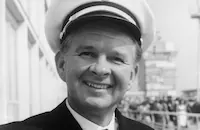A Dream of Kings

Brief Synopsis
Cast & Crew
Daniel Mann
Anthony Quinn
Irene Papas
Inger Stevens
Sam Levene
Val Avery
Film Details
Technical Specs

Synopsis
Greco-American gambler and folk philosopher Matsoukas, a paragon of integrity, ekes out a marginal existence in Chicago. When his seven-year-old son Stavros is diagnosed as terminally ill, Matsoukas is convinced that only the sun of his native Athens can cure the boy. Pressed for air fare to Greece, Matsoukas begs from his generous friend Cicero, who dies before he can honor the request. Although they are lovers, the widow Anna, proprietress of a local bakery, denies him a loan. Desperate for money, Matsoukas loads his dice. Discovered and shamed, he permits himself to be beaten mercilessly. In his absence, his wife Caliope steals her mother's savings, enabling father and son to return to the homeland.

Director

Daniel Mann
Cast

Anthony Quinn

Irene Papas

Inger Stevens

Sam Levene
Val Avery
Tamara Daykarhanova

Peter Mamakos

James Dobson
Zvee Scooler

Bill Walker
H. B. Haggerty

Alan Reed Sr.
Radames Pera
Theoharis Lemonopoulos
Stasa Damascus
Katherine Theodore
James Fortunes
Ernest Sarracino
Renata Vanni
Chris Marks
Sandra Damato
Effie Columbus
Peter Kogeones
Alberto Morin
Peter Xantho
George Savalas
Tol Avery
Tony Jochim
George Michaelides
Lisa Pera
Lisa Moore
Crew
Charles Blackman
Harry A. Caplan
Raymond Daniels
C. E. Dismukes
James S. Elliott
Bill Ford
Robert Goodstein
Walter Hannemann
Ian [mclellan] Hunter
William Kiernan
Jack Kirschner
Richard H. Kline
Boris Leven
John Mick
Joe Nayfack
Alex North
Harry Mark Petrakis
Harry Mark Petrakis
James Rosenberger
Jules Schermer
Eric Seelig

Videos
Movie Clip


Film Details
Technical Specs

Articles
A Dream of Kings
The novelist Harry Mark Petrakis, who carved his literary niche with telling chronicles of life in the Greek neighborhoods of Chicago's South Side, collaborated with Ian McLellan Hunter in adapting his 1966 best-seller for the screen. The narrative revolves around the charismatic ne'er-do-well Leonidas Matsoukas (Quinn), a middle-aged one-time amateur wrestler who makes a living on the margins, occasionally from his maintenance of an all-purpose counseling office in a dingy walk-up, but largely by wagering his wad at the local bookie hall where his cronies regard him as a neighborhood legend. The pre-dawn hours find Matsoukas returning to the apartment he shares with his spouse Caliope (Irene Papas), who bears the stress of putting up with his escapades, and the three kids who idolize him.
Chief in Matsoukas' affections is his sickly seven-year-old son Stavros (Radames Pera); the doting father scoffs at the grim prognosis of the neighborhood doctor, certain that all that would be necessary for the boy's recovery is exposure to the air and sunshine of their ancestral land. Unfortunately, the price of two airfares to Greece seems out of reach, at least until Matsoukas' loyal sidekick Cicero (Sam Levene) offers up his life's savings in a burst of generosity. Unfortunately, fate has cruel plans, and Matsoukas is forced to put his good name on the line in order to make good on his promises to the youngster.
Critics of the day were effusive in their praise of Quinn's expectedly robust turn. "Quinn once again playing super-mensch, the noble ethnic, and it is one of his most powerful and convincing performances," Variety opined. Rex Reed wrote in Holiday that the project was a "tour de force by Anthony Quinn. His performance is hypnotic," while William Wolf proclaimed in Cue that "Anthony Quinn at peak talent--he is such a damned effective actor and beautiful man that his performance towers!" Effectively helmed by Daniel Mann, the film also offered a memorable tapestry of supporting performances; from Papas, in the fourth of seven collaborations with Quinn, as the wife whose sufferings are far from silent, to Levene as the hapless buddy, to a raft of welcome character veterans like Alan Reed, H.B. Haggerty and Val Avery among the gambling joint populace.
The role of Stavros offered an effective screen debut for the nine-year-old Pera, who would go on to find his place in pop culture a few short years later with his 1972-1975 stint as the young Kwai Chang Caine, AKA "Grasshopper," in the flashback sequences of TV's Kung Fu. A Dream of Kings is also noteworthy as the last big-screen appearance for Inger Stevens, offering memorable work as a pretty young widow slowly but inexorably worn down by Matsoukas' seductive attentions. Her onscreen heat with Quinn was actually a bit of art imitating life, as they had been steeped in an affair a decade prior when he had directed her in The Buccaneer (1958). Sadly, it wasn't long afterwards that the troubled Swedish beauty lost her long battle with her inner demons; she was only thirty-five when she died from a barbiturate overdose in 1970.
Producer: Jules Schermer
Director: Daniel Mann
Screenplay: Ian Hunter; Harry Mark Petrakis (novel)
Cinematography: Richard H. Kline
Art Direction: Boris Leven
Music: Alex North
Film Editing: Ray Daniels, Walter Hannemann
Cast: Anthony Quinn (Matsoukas), Irene Papas (Caliope), Inger Stevens (Anna), Sam Levene (Cicero), Val Avery (Fatsas), Tamara Daykarhanova (Mother-in-law), Peter Mamakos (Falconis), James Dobson (Doctor), Zvee Scooler (Zenoitis), Bill Walker (Kampana).
C-107m.
by Jay S. Steinberg

A Dream of Kings
Quotes
Trivia
Miscellaneous Notes
Released in United States on Video December 14, 1988
Released in United States Winter December 1969
Last film for Inger Stevens.
Released in United States Winter December 1969
Released in United States on Video December 14, 1988













